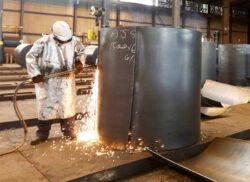 The local steel industry remains heavily dependent on imported raw materials, as no local sources have been developed to date making the manufacture of steel locally quite expensive. Reducing this high import bill is possible if high quality steel can be produced more cheaply locally. The government’s strategies to promote the sector include readiness to facilitate investments in commercial exploitation of iron deposits in the country and setting up a Scrap Metal Council to regulate the scrap metal industry which is important in the sector.
The local steel industry remains heavily dependent on imported raw materials, as no local sources have been developed to date making the manufacture of steel locally quite expensive. Reducing this high import bill is possible if high quality steel can be produced more cheaply locally. The government’s strategies to promote the sector include readiness to facilitate investments in commercial exploitation of iron deposits in the country and setting up a Scrap Metal Council to regulate the scrap metal industry which is important in the sector.
Numerical Machining Complex (NMC) has been identified as a focal point for promoting development of iron and steel industry. The NMC will be transformed to be able to realize its full potential in supporting the development of iron and steel sector. Kenya has iron ore reserves in the counties of Taita Taveta, Kitui and Tharaka that can support steel production. The Government has approved a partnership between South Korean steel maker PSCO and NMC to build the integrated steel mill in Machakos County. Limestone as a raw material in for making steel is found in Kitui, Kajiado, and Taita Taveta counties..
Motor assembly industry
The Government has drafted the National Automotive Policy to streamline the motor assembly industry. The policy aims at spurring growth in local car assembly to promote utilization of locally manufactured car parts, local content, sub-contracting, innovation, research and development, capacity and skills development and training, and technology transfer.
International growth centre
The Ministry of Industrialization has entered into partnership with the International Growth Centre (IGC), which is a policy and research institute based at the London School of Economics (LSE) and Oxford University. Partnering with IGC, and by extension LSE, will therefore provide us with opportunities to learn and develop effective and sustainable economic policies from the network of World-renowned economists.
In addition, the partnership provides opportunities to expand knowledge, skills, attitudes and expertise to create the next generation of Kenyan millionaires. The partnership between this Ministry, IGC and the Private Sector is expected to take evidence –based policy formulation and implementation a notch higher leading to increased competitiveness and productivity at the regional, continental and global level.
Scrap metal council
The Mandate of the Council is derived from the Scrap Metal Act, 2015 for the regulation of dealings in scrap metals which is to Advise the Cabinet Secretary on the appropriate measures and mechanisms for:
- Regulating the scrap metal industry in ensuring economic growth, protection of public health and conformity to the principles of environmental stewardship as required by the Basel Convention.
- Protecting public interest against vandalism, theft of utility infrastructure and private property
- The methods of attracting investors on the utilization of excess scrap materials and supporting existing users of scrap metal.
- The applicable license fees to be prescribed under the Scrap Metal Act; Any other matter relevant to the operations of the Scrap Metal Act.
Cement production

Kenya’s mature and highly developed cement industry is critical to the Big 4 Agenda’s Manufacturing pillar. Cement production includes cement, lime, ballast, roofing tiles, limestone products, concrete products and ceramic tiles. Leaders in cement output are Bamburi Cement Limited, National Cement Company, Mombasa Cement, East African Portland Cement Company and Savannah Cement. The Government’s heavy investment in transformational infrastructure projects raised consumption of locally produced cement. This proved to be very critical, especially during the height of the COVID-19 pandemic shutdowns.
They include major transport projects like the Nairobi Expressway, Western Bypass, floating bridge across Likoni-Channel, Mombasa Southern Bypass and the Upper Hill-Raila Odinga Way Link Road among others. The State Department for Housing and the National Housing Corporation (NHC) built 2,332 and 338 units respectively in public residential buildings. Exports to other countries also helped offset the decline in Kenya’s export of cement products to Uganda and Tanzania, which dropped by 36.6 per cent in 2020, according to information from the National Economic Survey 2021. Cement exported to all other countries rose significantly to 108.5 thousand tonnes in 2020 from 42.0 thousand tonnes in 2019.
Cement production rose significantly by 21.3 per cent to 7,473.6 thousand tonnes in 2020 over a five-year period. Support from the Government helped cement producers expand production, boosting cement consumption and stocks by 20.3 per cent to 7,375.6 thousand tonnes in 2020. The 2020 consumption level was only 200,000 tonnes less than the all-time record of 6.7 million tonnes set in 2014 when construction of the first phase of the Standard Gauge Railway (SGR) was ongoing. In a recent interview with The Africa Report (https://www.theafricareport.com/49853/afcfta-will-boost-kenya-cement-demand-bamburi-ceo/) Seddiq Hassani, CEO of Bamburi Cement, the largest cement producer, says that Kenya is on course to match North African countries in terms of output.
Aiding this growth will be the Africa Continental Free Trade Agreement (AfCFTA) that the Government is keen on Kenyan firms taking full advantage of as member countries invest in roads, rail and ports thereby driving up demand for cement, says Hassani in the article. Even more interesting, the Bamburi CEO this can see the consumption of cement triple over the next 15 to 20 years.
